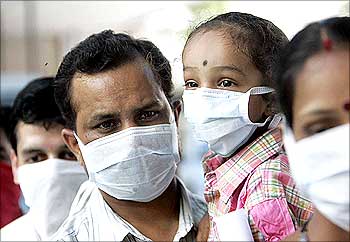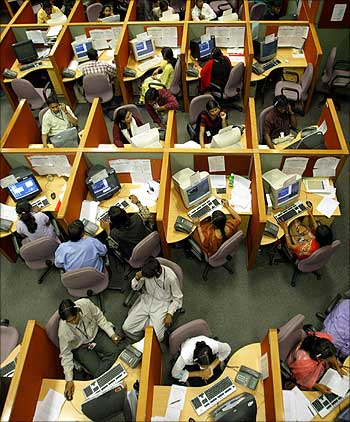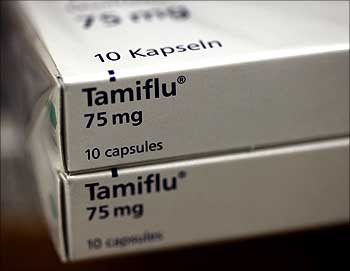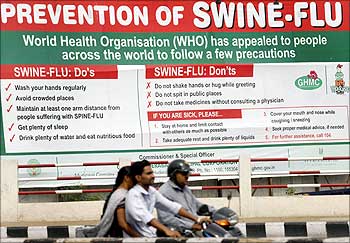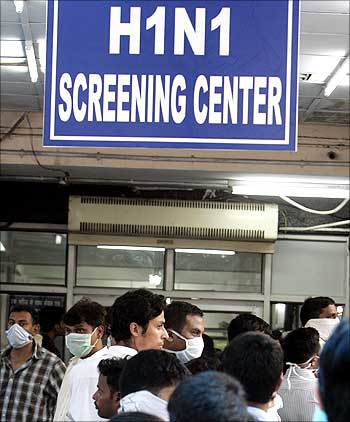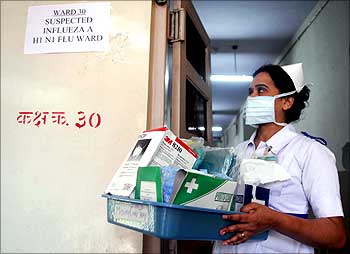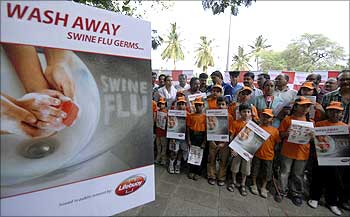 | « Back to article | Print this article |
Flu: IT, BPO firms see 20% fall in attendance
With the growing swine flu scare across the city, a number of IT-BPO service providers here are seeing up to 20 per cent drop in attendance.
The growing fear among software professionals is of getting infected while travelling to work in buses or cabs. And so, many IT-BPO firms have allowed their people to "work from home" if it fits their job profile. Some are planning to hire laptops to encourage employees to stay at home and work.
There are around 150,000 software professionals working here, while the number with BPO and other IT-enabled services is another lakh (100,000). Around 5,000 cabs and some 400 buses ferry these 2.5 lakh (250,000) people daily round Pune. And the mode of transportation is a serious cause of concern.
Speaking to Business Standard, a staffer from IBM, who works with the product development unit, said: "The attendance levels at the office have dipped since Monday. The office administration has asked staffers to work from home whenever possible. While staffers from the IT services division have to work from workstations at office, professionals from the product department are working from home, using laptops." Another IBM official said: "We have been advised to take rest even if one of our family members is suffering from cold, cough or fever. The overall complex built has led to dropped attendance levels." Read on for more...
Flu: IT, BPO firms see 20% fall in attendance
Amdocs is reportedly planning to hire laptops for employees who do not have any facility to work from their homes.
Said a source, "Our manager just received an email regarding this. We have submitted details about who all have laptops of their own and access to the Internet. There is a possibility that we may take laptops on rent to give to employees to be able to operate from home until we feel the situation comes under control." Another with Coreobjects said staffers have been advised to rest at home if certain symptoms were seen. "However, we have not seen a sharp decline in attendance. Some people, though, are avoiding coming to office."
Zensar Technologies vice chairman and CEO Ganesh Natarajan said, "We do not have 'work from home' systems at Zensar. However, if staffers as well as their family members have shown symptoms similar to those of swine flu, then they have been allowed to work from home. Proper instructions have been given to staffers to avert spreading of the disease. However, we have not seen any significant change in attendance levels as of now."
Zensar has also reduced or postponed official travel plans of staffers.
Flu: IT, BPO firms see 20% fall in attendance
"Those who have Internet access have been asked to work from home; the rest are working in shifts. That way we can avoid crowding. Also, we are distributing amla candies to our employees, as amla is best for boosting immune systems," said Nikunj Verma, vice-president, human resource, Ignify Software. Absenteeism has also shot up, as more people want to stay indoors.
"We have close to 20-25 per cent absentees daily on an average since this whole swine flu thing has come up," said a BPO employee.
Avaya India Pvt Ltd, with its office in Magarpatta City, has told its employees to stay away from the workplace as far as possible for almost a week. "Management sent us an email yesterday, informing us that we have an option of operating from home.
Govt may allow controlled retailing of vaccine
The government may allow restricted retail sales of Oseltamivir capsules, the only known medicine for treatment of H1N1 flu (swine flu), if the number of patients continue to increase in the coming weeks.
The health ministry is exploring the possibilities of permitting the sale under Schedule X of the Drugs and Cosmetics Act, 1940, to allow regulatory authorities keep track of the entire supply chain.
Retail chemists need special permission to sell Schedule X medicines. The chemists will also have to maintain a copy of every prescription against which the drug has been sold.
"The health ministry is yet to take a decision. If included in the Schedule X list, the government will be able to keep track of the movement of oseltamivir capsules. Its sale will be strictly against prescription and through select outlets. The medicines will be stored separately, under proper lock and key," sources said.
Govt may allow controlled retailing of vaccine
It is known that less than five per cent of registered chemist shops and hospitals in Delhi sell Schedule X medicines.
Currently, no importer or manufacturer of the medicine is allowed to sell oseltamivir in the open market. The entire stock is procured by the government, to be supplied through its own channels. The move is also intended to arrest the possibilities of illegal hoarding and sale of the medicine in the country.
In a hurriedly convened meeting with state drug controllers from all parts of the country on Wednesday, the Union health ministry reiterated its resolve to stop unauthorised sale of medicines.
The regulators were also asked to step up vigil against the hoarding and grey market sale of protective masks. The ministry also held talks with companies such as Cipla, Hetero, Ranbaxy, Natco, Strides and Roche to ensure the supply of Oseltamivir capsules on a competitive pricing basis.
Flu impact on travel, hotels still limited
Swine flu has impacted air travel to and from Pune by 40 per cent. Around 15 per cent of hotel bookings have also been cancelled.
However, the travel and hospitality sector feels the impact is still limited; only, if the flu scare isn't brought under control, all this could get worse.
"Flight bookings on the Pune route have fallen 40 per cent. Otherwise, no other route has seen any major decline in the traffic or cancellations," said Subhash Goel of STIC Travel Group.
"Flights in the Pune sector have been badly affected. The effect in the Chennai sector is very little and Mumbai is not affected. Cancellations of bookings in hotel have been 10-15 per cent," said Travel Agents Association of India's president, Rajinder Rai.
Flu impact on travel, hotels still limited
A section notes that it has only been a week since India has seen a surge in the number of cases. Also, people have got their tickets booked for the Independence Day weekend and it is unlikely that this would be cancelled.
After this weekend holiday is over, if bookings do not pick up for the festive season, it would be a matter of serious concern.
"As of now, we have not seen any decline in travel or cancellations. It would be very premature to come to any conclusion on the swine flu affect. If the flu continues, it will be visible in 10 days from now," said Ashish Kishore from yatra.com.
Airline, hotel stocks catch cold on flu fear
The rapid spread of swine flu has hit share prices of top airline and hospitality companies as market players fear a sharp drop in travel and tourism due to the flu scare. In contrast, shares of top pharmaceutical companies have seen a sharp rise during the period.
In the last six trading sessions, while the Sensex has declined 5.55 per cent from its calendar year closing high of 15,924 on August 3, shares of top airline companies, including Jet Airways, Kingfisher Airlines and SpiceJet, and top hotel companies, including Indian Hotels, Hotel Leela Venture, TajGVK Hotels, Asian Hotels and EIH Associates, have declined in the range of 5-15 per cent (see table).
Shares of the Tatas' hospitality companies have fallen the most compared with other top players in the business.
"Clearly, travel, tourism, entertainment and retail sectors will be the worst impacted, whereas pharma companies manufacturing disposable masks and Tamiflu tablets stand to gain from a surge in demand," said CLSA research analyst Aniradha Dutta in a report on August 10.
Airline, hotel stocks catch cold on flu fear
In Mumbai, the financial capital of the country, the government has announced closure of schools for seven days and movie theatres and malls for three days.
"Markets are witnessing some impact of swine flu and if the scare continues, hotel, tourism and airline stocks could come under further pressure," said Ambrish Baliga, vice-president of Mumbai-based Karvy Stock Broking.
Though global markets have not pressed the panic button yet, there could be some worry if the virus spreads, according to some analysts. Baliga, however, says that the panic in the stock market is unwarranted.
"At present, we are in the thick of the swine flu scare. Markets will start discounting it in some time. In the past, it has been noticed that any major epidemic does not last for more than two-three months. The stocks will present a good buying opportunity now. The scenario will further improve as the Commonwealth Games in September give an impetus to travel and tourism in country," said Baliga.
Meanwhile, shares of domestic drug firms that make the generic version of Roche's Tamiflu, used to treat the flu virus, are gaining momentum. While Strides Archolabs has gained over 10 per cent in past six trading sessions, Ranbaxy and Cipla have gained nearly 4 per cent.
The government's plan to stockpile 20 million dosages of Tamiflu drug is expected to benefit Ranbaxy, Cipla, Strides and Hetero. This, however, would not have any major impact on these companies' earnings, said a pharmaceutical analyst from a leading brokerage house.
Ranbaxy, majority-owned by Japan's Daiichi Sankyo, produces oseltamivir bulk drugs and formulations. According to a company officials, it can provide close to a million capsules in the domestic market in the next few weeks.
Online social networking to provide swine flu updates
To encourage information sharing, collaboration, and interactivity, the Centers for Disease Control and Prevention (CDC) and the US Department of Health and Human Services (HHS) have been working jointly to provide consumers and partners with social media tools like widgets, mobile information and online videos.
For instance, CDC allows website owners to add a button or badge to their website to let visitors know how to stop the spread of H1N1 flu and where to get more information about H1N1 flu.
You can view and share H1N1 flu images from the CDC Flickr site or the CDC Public Health Image Library or follow updates from CDC on Twitter.
Moreover they also have online videos on the YouTube channel, podcasts on the H1N1 flu which can be downloaded (audio and/or video podcasts) on desktops and portable music/video players. Last, but not the least, you can subscribe to RSS updates for ongoing news related to the H1N1 flu outbreak.

